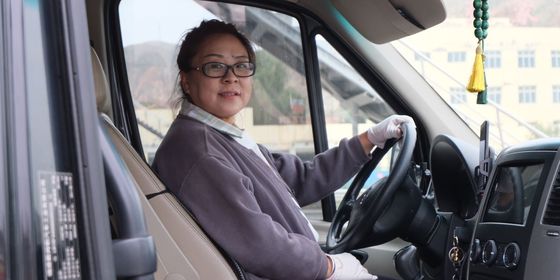As ticket vendors disappear from China’s buses, their legend remains
In the early 1960s, the Chinese people were asked to learn from Lei Feng. A semi-mythical foot-soldier assiduously devoted to Mao Zedong Thought and serving the people, Lei’s legend helped the Communist Party to rally a nation still reeling from the disastrous Great Leap Forward. In the 1990s, as China’s new market economy picked up speed, the people were given a new ideological model: a Beijing public transit ticket vendor named Li Suli (李素丽).
Li’s backstory, like Lei’s, was emphatically ordinary. The daughter of a bus conductor, Li dreamed of becoming a newscaster but scored 12 points too low on the entrance exams to go to college. She then joined Beijing Bus Route 60 and, believing that “even the least prestigious jobs need to be done well”, became the best and hardest working ticket vendor she could be. In her slogan-filled, 18-year career she became the “cane of the elderly”, prepared newspapers and spare cushions for passengers, and once shamed a passenger by cleaning up his spit from the floor. While the rest of the the country was making demands about job security, social mobility, and increased wages under the new market economy, Li served years at a humble job with a responsible attitude and smile, eventually earning the title “Nation’s Model Worker” for demonstrating that old Party adage, “labor is the most glorious thing”.
Ironically, 20 years after Li became the nation’s exemplar of the ordinary, commonplace worker, her job has become all but obsolete. Across China, IC card systems and standardized fares have taken over vendors’ basic role, while automated recordings and smartphones replaced them at announcing stops and giving travel directions. Most Chinese cities have already done away with the position. In August, 2015, Shanghai announced that they would put “vendor-less buses” on all of their routes except four that departed from the train station, citing itself as one of the last cities in China to catch up with the times.
Today the last stand of this disappearing profession is Beijing, Li’s home base and a city with a transit system notorious for extensive subsidies and old-style bureaucracy; for instance, until prices were reformed in 2014, a subway trip was a steal at a flat rate of 2 RMB, and bus fares started at 0.4 RMB if paying with an IC card. Even so, the system is slowly changing. In July of this year, ticket vendors on Beijing’s Bus Route 300 went on strike to protest the phasing out of their position from the city’s transit system.
Among their grievances, as told by a spokesperson who documented the incidents online, the ticket vendors were protesting the loss of their “iron rice bowl”, the lifetime job security that used to be guaranteed by China’s socialist economy. “Vendors work hard, have never done anything wrong, yet we’ve been told that our work will be replaced by machines and security guards,” a vendor named Liu Ying (alias) reported. They also protested the fact that the transit company, which is part of a state-owned conglomerate, had not announced plans to place laid-off workers in other positions at the company. “We’re getting up there in age and truly can’t change our field,” Liu complained.
Reactions from Beijingers who followed the incident online were mixed, with several pointing out that working hard at the same job for many years hardly qualified a person for job security anywhere in the current economy, never mind at a job that is now redundant. Up and down the country, iron rice bowls had been shattering since the 1980s. Ticket vendors, in the capital especially, had been insulated until now by the inertia of state enterprises and their bloated benefit networks.
Whereas ticket vendors once represented values of old-fashioned hard work and honest reward vital to a newly reformed society, they now symbolize inefficiency and outdated attitudes about employment, which have no place in an increasingly technical and competitive economy. Primarily older women (and some older men) who’ve worked long years in their company at the detriment of gaining other skills, ticket vendors fall under what economists call the “overemployment” phenomenon in reforming socialist economies (RSEs); their grievances and occasional protests remain a delicate subject in China as it struggles to balance economic growth and social harmony.
Both Beijing and Shanghai’s transit authorities have refused our request for comment. The original copies of the Sina Weibo posts by the spokesperson covering the strike have been removed, though the account remains active.
As hinted by Liu’s comments, aside from machines the other nemesis of the ticket vendors is the transit security guard. This is a relatively new position, also mostly found in Beijing and Shanghai, that was added to Beijing buses this year as vendors were laid off. The two groups are polar opposites in a number of ways. Ticket vendors are affectionately called “ticket vending aunties”. They are required to have a Beijing household registration and collect generous benefits despite belowaverage pay, around 4,300 RMB as reported online.
The guards are often young, in their teens and early 20s. They are also reported to be migrants from outside of Beijing, and are stereotyped as apathetic, ignorant of local geography, and socially awkward in contrast to the poised and opinionated “aunties”. Local media and online job posts also indicate that transit companies are trying to recruit guards and “service personnel” with college or technical school education in order to modernize their image. Guards are employed by private contractors, whose job ads indicate that they are paid only half the reported average salary of ticket vendors andmention no social insurance.
“Last Stop” is a story from our newest issue, “Climate Change”. To read the whole piece, become a subscriber and receive the full magazine. Alternatively, you can purchase the digital version from the iTunes Store












